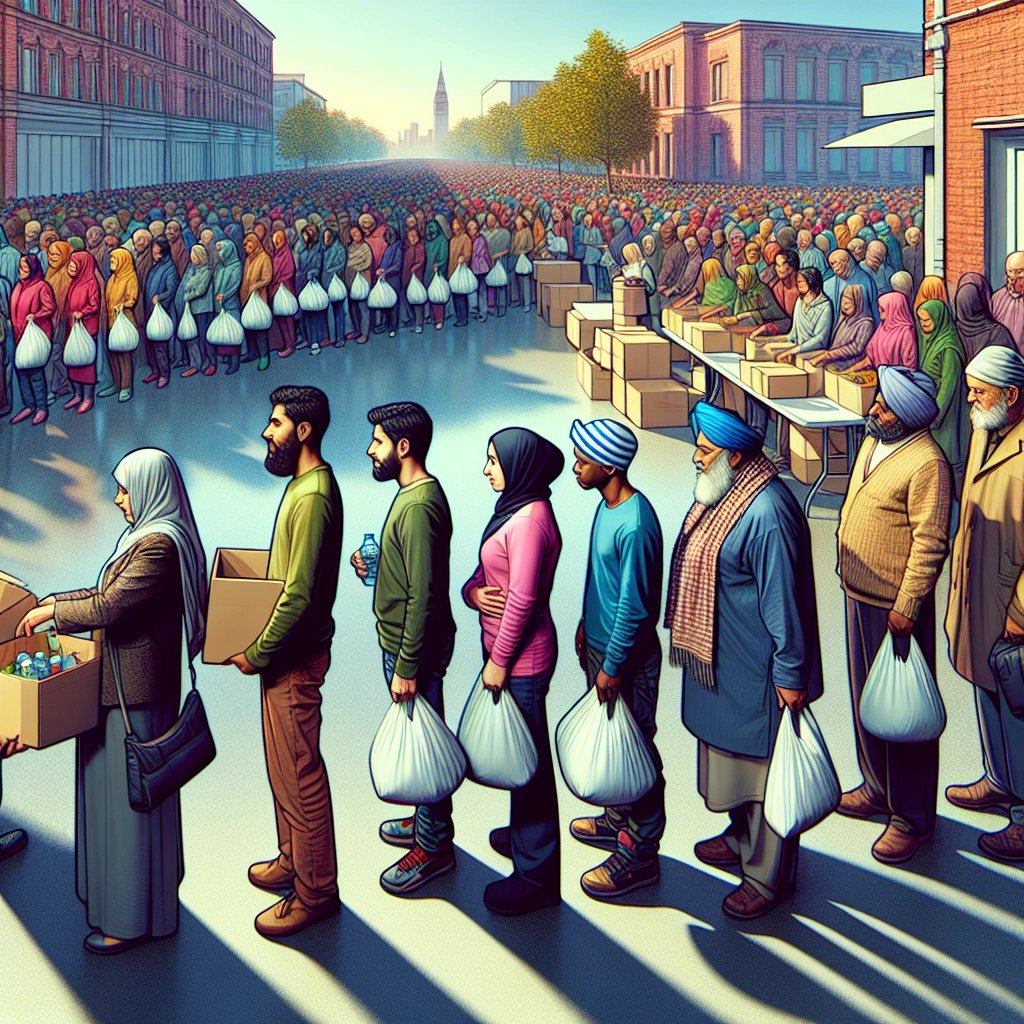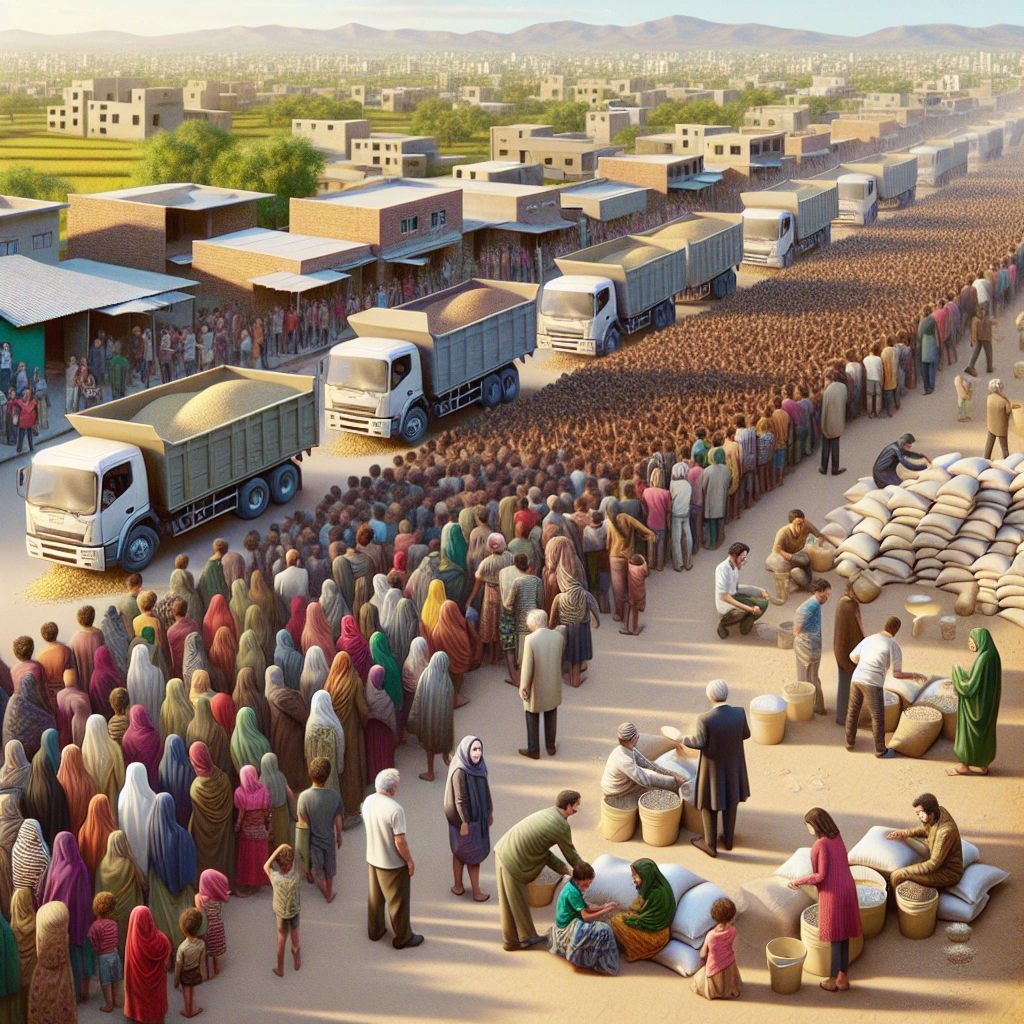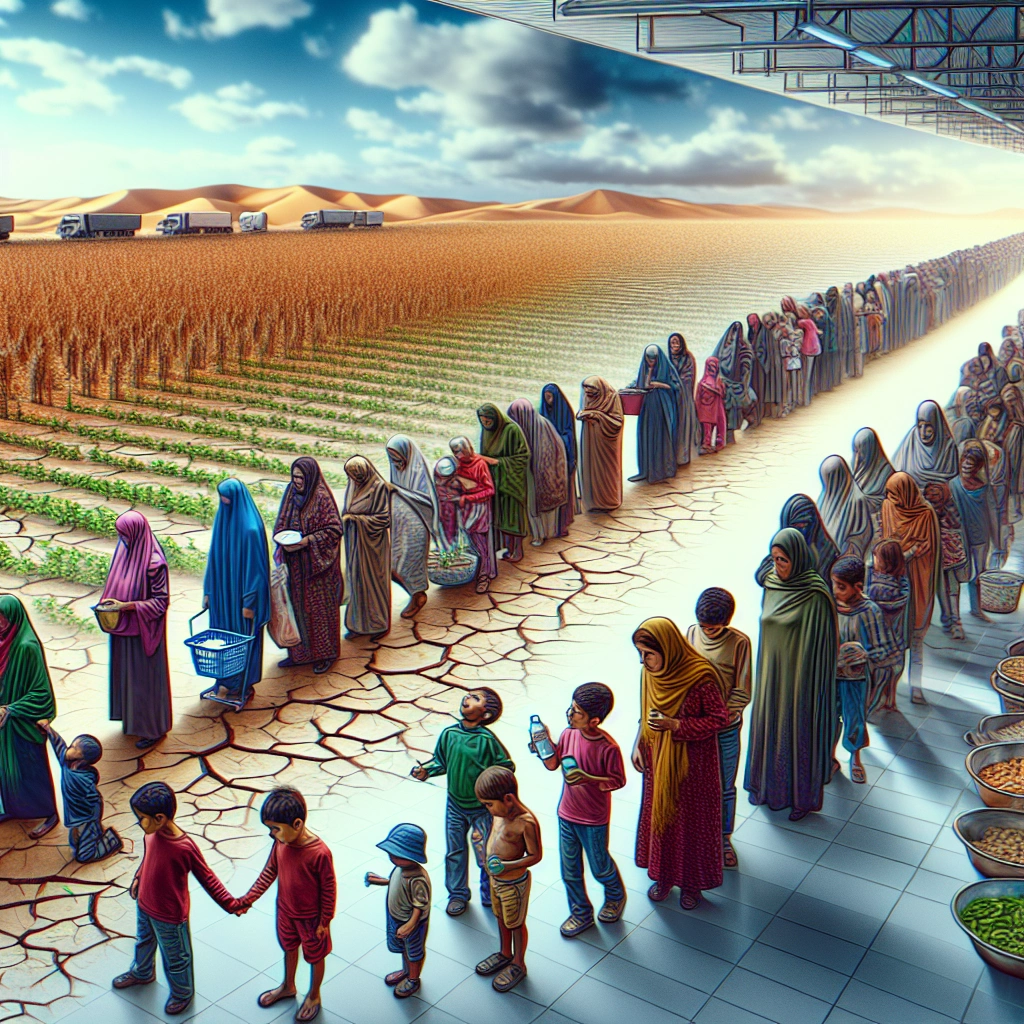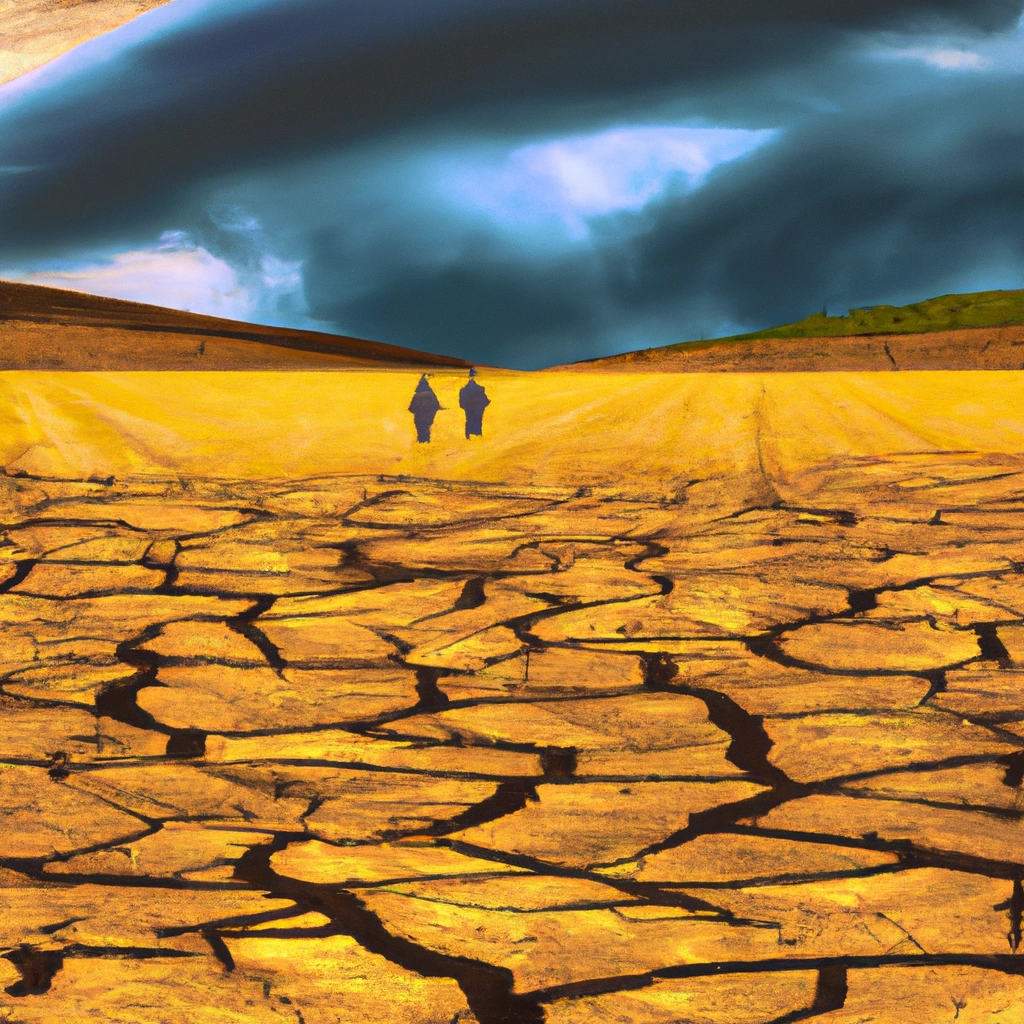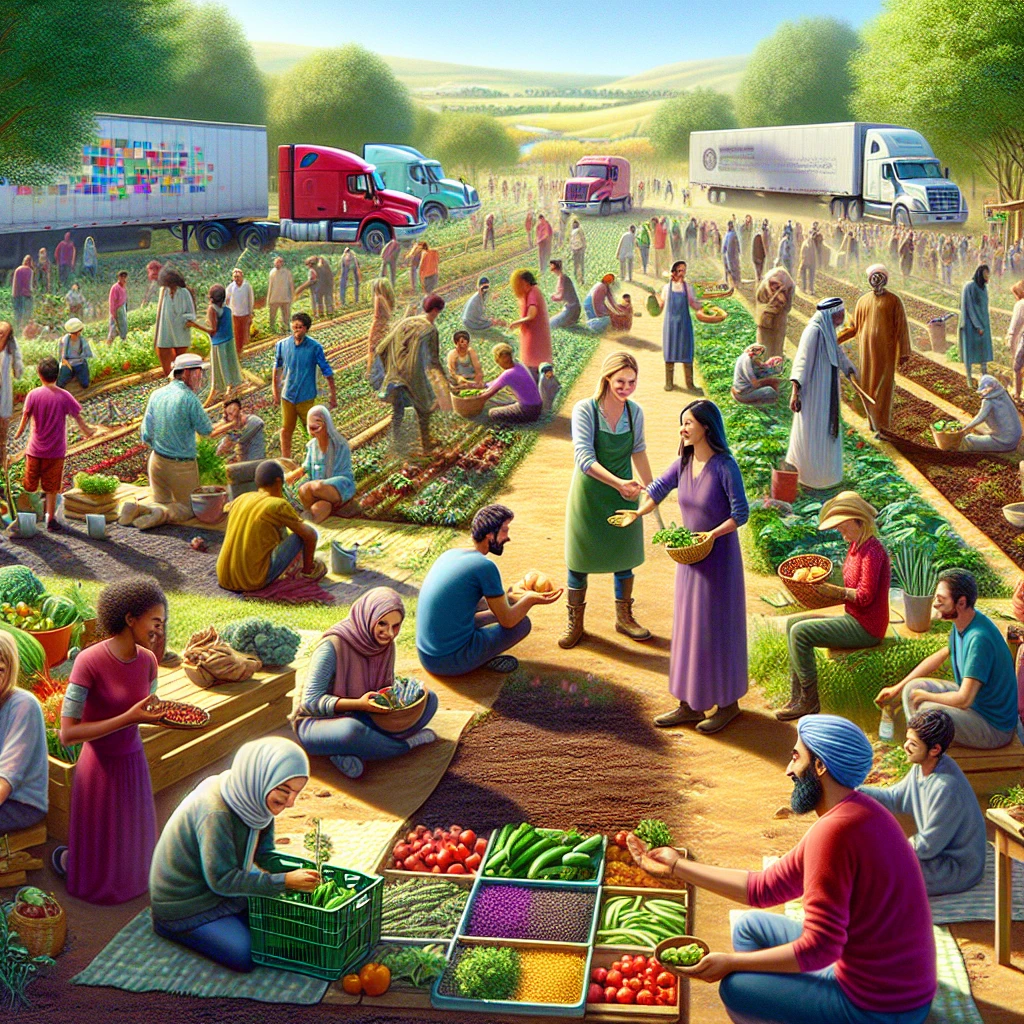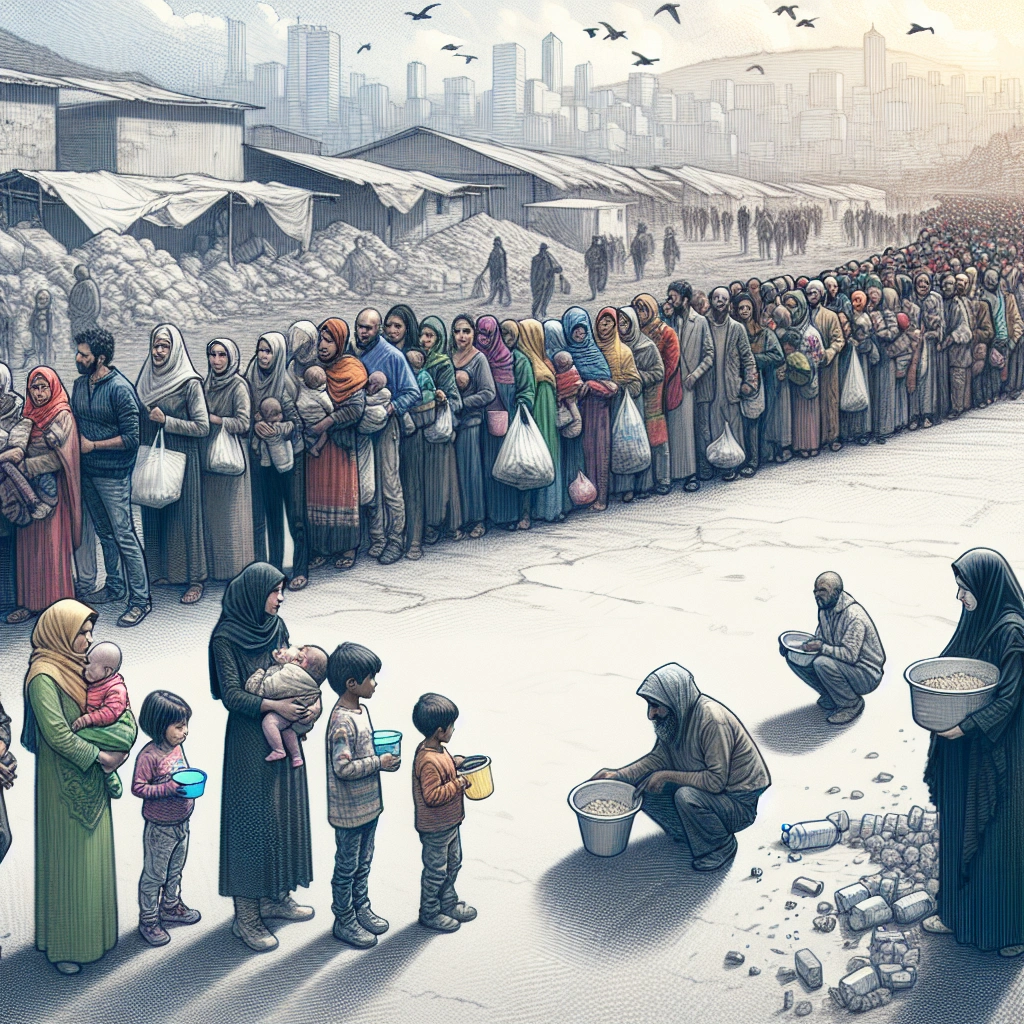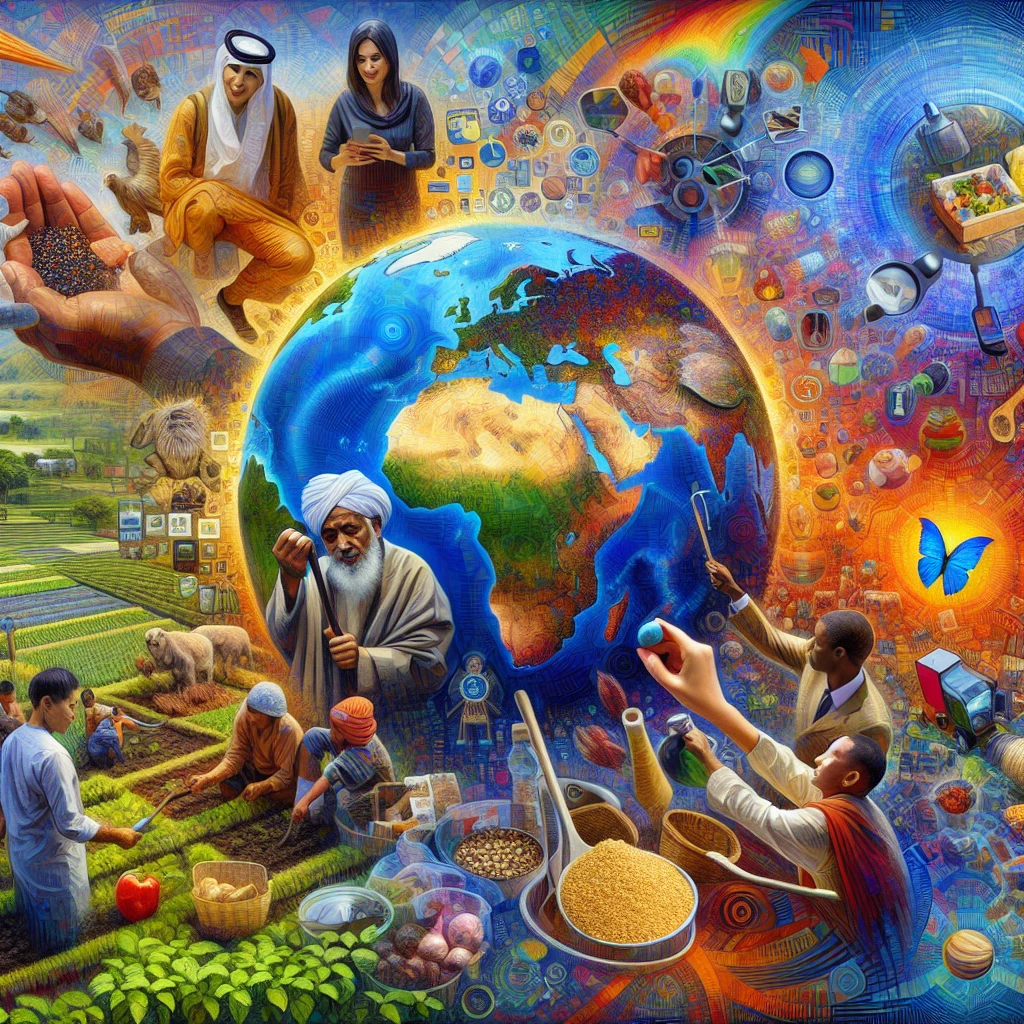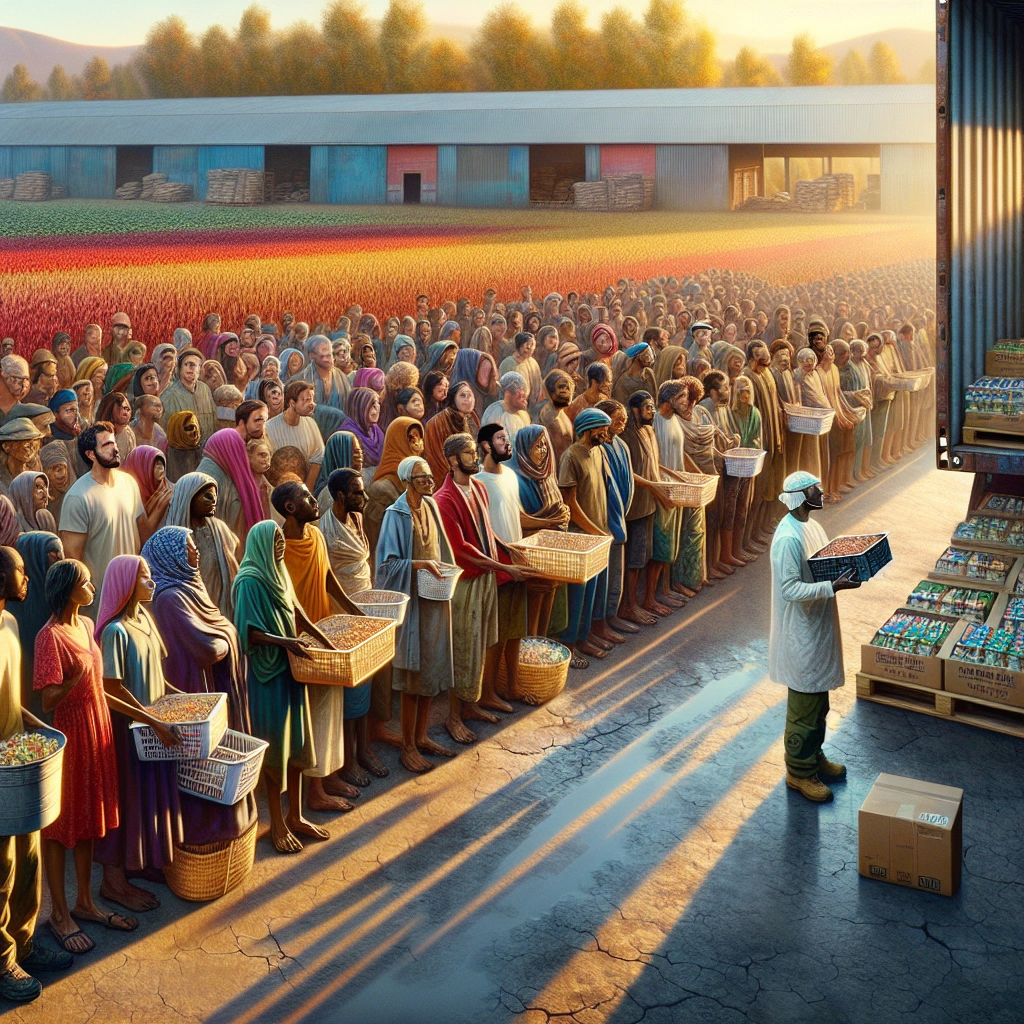

Food shortages refer to the lack of access to an adequate supply of food in a specific region or country. It is a critical issue that affects millions of people around the world, leading to malnutrition, hunger, and even starvation.
Food shortages are a global concern that impacts the health, well-being, and economic stability of communities and nations. Addressing food shortages is essential for ensuring food security, reducing poverty, and promoting sustainable development worldwide.
Check out this Youtube video: “One child suffers every minute in 15 countries because of the food shortages” and learn about the list of countries facing food shortages and how it’s impacting children’s lives.
Understanding the Global Food Crisis
Food shortages can be attributed to various factors such as extreme weather events, armed conflicts, economic crises, and trade restrictions placed by countries. These factors contribute to a lack of access to nutritious and sufficient food, leading to acute food insecurity for millions of people globally.
Factors contributing to food shortages
- Climate Extremes: Devastating weather patterns, including droughts and excessive moisture, can significantly impact crop yields, resulting in food scarcity.
- Armed Conflicts: Regions affected by conflicts suffer disruptions in food production, transportation, and distribution, exacerbating food shortages.
- Economic Shocks: Soaring prices of essential resources like fertilizer, coupled with balance of payment pressures, contribute to global food crisis.
Impact of food shortages on communities and economies
- Community Health: Acute food insecurity poses immediate danger to the lives and livelihoods of millions, leading to malnutrition and starvation, especially in countries like the Democratic Republic of the Congo, Afghanistan, Syria, and others.
- Economic Strain: Expenditure on food accounts for a significant portion of total household spending in low-income economies, and the rising food prices further exacerbate economic misery.
| Factors Contributing to Food Shortages | Impact of Food Shortages on Communities and Economies |
|---|---|
| Climate Extremes | Community Health |
| Armed Conflicts | Economic Strain |
| Economic Shocks |
The global food crisis is a multi-faceted issue caused by a combination of climate extremes, armed conflicts, and economic shocks. These factors not only contribute to food shortages but also have profound impacts on the health of communities and the economic stability of nations.
List of Countries with Food Shortages: Africa
Sub-Saharan Africa
Sub-Saharan African countries experiencing severe food shortages include South Sudan, Somalia, Nigeria, and the Democratic Republic of Congo. These countries are grappling with conflict, climate shocks, and economic challenges, exacerbating food insecurity for millions of people.
The Horn of Africa
The Horn of Africa, particularly South Sudan, is facing catastrophic food insecurity, with 75% of the population experiencing severe food shortages. Additionally, Somalia is grappling with acute hunger due to a severe drought, leaving millions in urgent need of food assistance.
| Country | Food Shortage Status |
|---|---|
| South Sudan | Catastrophic |
| Somalia | Acute |
| Nigeria | Severe |
| Democratic Republic of Congo | Critical |
List of Countries with Food Shortages: Asia
South Asia
- Afghanistan: Facing severe food shortages due to conflict and economic instability.
- Bangladesh: Struggling with food insecurity, especially in rural areas.
- India: Dealing with high levels of food insecurity, particularly among marginalized communities.
- Pakistan: Battling acute food shortages exacerbated by climate extremes and economic challenges.
Southeast Asia
- Myanmar: Experiencing food shortages due to political unrest and limited access to humanitarian aid.
- Laos: Facing increasing food insecurity, exacerbated by reliance on wheat imports and economic vulnerability.
- Thailand: Coping with food insecurity exacerbated by the impact of the pandemic and the marginalization of migrant workers from neighboring countries.
| Country | Food Shortage Severity | Contributing Factors |
|---|---|---|
| Afghanistan | Severe | Conflict, Economic Instability |
| Bangladesh | Significant | Rural Food Insecurity |
| India | High | Marginalized Community Food Insecurity |
| Pakistan | Acute | Climate Extremes, Economic Challenges |
| Myanmar | Increasing | Political Unrest, Limited Humanitarian Access |
| Laos | Growing | Wheat Imports Dependency, Economic Vulnerability |
| Thailand | Notable | Pandemic Impact, Migrant Worker Marginalization |
List of Countries with Food Shortages: Latin America
Central America
In Central America, countries such as El Salvador, Guatemala, Honduras, and Nicaragua have been significantly impacted by food shortages. The economic crisis caused by COVID-19, extreme climate events, and hurricanes like Eta and Iota have led to a drastic increase in food insecurity.
As a result, millions of individuals in this region are facing hunger, with the prevalence of moderate or severe food insecurity reaching alarming levels.
The Caribbean
The Caribbean region heavily relies on food imports for domestic consumption and to supply the tourism industry. Unfortunately, external factors and disaster-related events exacerbated by climate change have severely escalated food insecurity.
The impact of natural disasters, such as hurricanes, has upended the lives of millions, leading to a significant rise in the number of people facing moderate to severe levels of food insecurity.
List of Countries with Food Shortages: Europe
Eastern European countries
EU countries in Eastern Europe, such as Ukraine and Belarus, are experiencing food insecurity due to various factors including conflict, political instability, and economic challenges. These issues have led to disruptions in agricultural production and distribution, contributing to food shortages in these regions.
Southern European countries
In Southern Europe, countries like Spain and Italy are grappling with food shortages, particularly as a result of severe droughts that have impacted agricultural output. The scarcity of water and adverse weather conditions has led to challenges in crop cultivation, affecting the availability of food in these countries.
List of Countries with Food Shortages: Middle East
The Middle East is grappling with the profound challenges of food shortages, with several countries in the region particularly affected. Yemen stands out as one of the most severely afflicted countries, with approximately 83% of its population – around 24 million people – facing food insecurity.
The ongoing conflicts and the impact of the global food crisis have exacerbated the situation, making hunger more prevalent.
Iraq has also experienced a rise in food insecurity, driven by intermittent conflict and the fluctuating global oil prices. Over 4 million Iraqis are currently grappling with the issue as the nation grapples with its challenges.
In addition, countries across the Middle East have been directly impacted by the global food crisis due to supply disruptions and significant price increases of agricultural inputs, especially because of their high dependence on food imports from regions affected by conflicts.
It is apparent that the Middle East is facing a critical food security issue that demands immediate attention and proactive measures to mitigate the impact on the affected populations. As the region navigates these challenges, it’s vital for global humanitarian organizations and assistance initiatives to play a pivotal role in supporting the affected communities and addressing the underlying causes of food shortages.
| Country | Population Affected | Contributing Factors |
|---|---|---|
| Yemen | Approximately 83% | Ongoing conflicts, global food crisis |
| Iraq | Over 4 million | Intermittent conflict, fluctuating global oil prices |
The collective efforts of international communities and local governments are crucial in the fight against food shortages in the Middle East, aiming to alleviate the suffering of millions of individuals and families impacted by this pressing issue.
Addressing Food Shortages: International Aid and Assistance
Efforts by international organizations
The international community has rallied to address food shortages with unprecedented efforts. Organizations like the World Bank and the UN’s Food and Agriculture Organization (FAO) are at the forefront, focusing on supporting production, facilitating trade, and investing in sustainable food security.
These efforts aim to bolster food production, provide vital humanitarian assistance, and combat the root causes of food insecurity on a global scale.
Role of foreign aid in addressing food shortages
Foreign aid plays a pivotal role in addressing food shortages by providing crucial support to vulnerable populations in food-insecure countries. The World Food Programme (WFP) and other international aid entities have been instrumental in rapidly and adequately supporting people vulnerable to food insecurity.
Additionally, foreign aid contributes to addressing the underlying issues leading to food shortages, such as poverty, supply chain disruptions, and geopolitical conflicts.
| Country | Severity of Food Shortage |
|---|---|
| Afghanistan | High |
| Yemen | Critical |
| Venezuela | Severe |
| South Sudan | Extreme |
| Syria | Acute |
Foreign aid not only provides immediate relief but also fosters long-term solutions to prevent future food crises. Collaborative efforts and sustained foreign aid are crucial in ensuring that countries grappling with food shortages can build resilience and food security for their populations.
Government Response to Food Shortages
Policies and initiatives to alleviate food shortages
The government has implemented various policies and initiatives to alleviate food shortages. For example, the U. S. Government’s Global Food Security Strategy 2022-2026 aims to end global hunger, poverty, and malnutrition through the Feed the Future initiative.
This strategy includes increased emergency food security programming in countries severely impacted by the global pandemic and climate change.
Role of government in ensuring food security
The government plays a crucial role in ensuring food security. It provides essential support through programs like the Supplemental Nutrition Assistance Program (SNAP), which saw increased emergency benefits during the pandemic.
Additionally, the government’s Food Data Transparency Partnership promotes transparency regarding the effects of products, aiding consumers in making informed choices. Furthermore, the U. S. Department of Agriculture responded to disruptions in the food supply chain by distributing food through the Farmers to Families Food Box Program.
| Government Initiatives | Description |
|---|---|
| Global Food Security Strategy | Aims to end global hunger, poverty, and malnutrition |
| Supplemental Nutrition Assistance Program | Provided increased emergency benefits during the pandemic |
| Food Data Transparency Partnership | Promotes transparency for informed consumer decisions |
| Farmers to Families Food Box Program | Distributed food during disruptions in the food supply chain |
The government’s proactive measures and initiatives are vital in addressing and mitigating the impact of food shortages, ultimately contributing to global food security.
The Role of Agriculture in Addressing Food Shortages
Agriculture plays a crucial role in addressing food shortages by introducing innovative practices and sustainable farming techniques to boost food production. These innovative practices encompass indoor vertical farming, new agriculture technology, and the use of digital systems for food production.
Sustainable farming techniques, such as permaculture, hydroponics, and agroforestry, aim to improve food production while minimizing environmental impact and promoting long-term sustainability in the agricultural sector.
Innovative agricultural practices to combat food shortages
Innovative agricultural practices like indoor vertical farming offer a solution to combat food shortages by cultivating crops in a controlled environment, ensuring year-round production regardless of external conditions. This method optimizes space, reduces water usage, and minimizes transportation emissions.
Additionally, leveraging new agriculture technology and digital systems fosters efficiency, productivity, and sustainability in food production, bolstering efforts to combat food shortages globally.
Sustainable farming techniques to improve food production
Sustainable farming techniques, such as permaculture, hydroponics, and agroforestry, are pivotal in enhancing food production sustainably. For instance, permaculture integrates natural ecological processes and mimics the patterns and relationships found in nature to create productive and resilient agricultural systems.
Hydroponics, on the other hand, enables the cultivation of plants without soil, using nutrient-rich solution in water. Agroforestry involves the integration of trees and shrubs into farming systems, enhancing biodiversity and improving ecological resilience.
| Practice | Description |
|---|---|
| Permaculture | Embraces natural ecological processes to create resilient agricultural systems. |
| Hydroponics | Cultivates plants without soil, utilizing a nutrient-rich water solution. |
| Agroforestry | Integrates trees and shrubs into farming systems, enhancing ecological resilience and biodiversity. |
The role of agriculture in addressing food shortages is significantly enhanced through the implementation of innovative agricultural practices and sustainable farming techniques. These advancements not only improve food production but also contribute to environmental conservation and long-term food security on a global scale.
Examples of Successful Interventions
Countries across the globe have effectively addressed food shortages through a variety of interventions. One notable case study is the United States, where the Supplemental Nutrition Assistance Program (SNAP) has played a crucial role in reducing household food insecurity.
The provision of food subsidies and cash transfers has proven to be instrumental in supporting vulnerable populations.
In addition to the US, West African countries have implemented successful interventions to combat food shortages. In 2021, approximately 27 million individuals in West Africa urgently required food assistance due to factors such as drought, poverty, high cereal prices, displacement, and conflict.
Humanitarian aid from organizations like the World Food Programme has been vital in addressing these pressing food security challenges.
Lessons learned from these successful interventions underline the significance of providing immediate and adequate support to households facing food insecurity. Humanitarian assistance, production support, increased trade facilitation, and sustainable food security investment have emerged as critical strategies for addressing food shortages globally.
| Country/Crisis | Intervention | Outcome |
|---|---|---|
| United States | SNAP (Supplemental Nutrition | Reduced household food insecurity |
| Assistance Program) | ||
| West Africa | Humanitarian assistance from | Alleviated food insecurity amidst various crisis |
| World Food Programme |
These case studies and lessons learned offer valuable insights for other nations grappling with food shortages, emphasizing the importance of swift and targeted interventions to support vulnerable populations.
Challenges in Addressing Food Shortages
Political instability often hinders the delivery of food aid to vulnerable populations. In conflict-affected regions, humanitarian aid organizations struggle to access and provide essential food supplies, exacerbating the existing food shortages.
Furthermore, armed conflicts disrupt agricultural activities, forcing farmers to abandon their lands and leading to decreased food production, thereby contributing to the prevailing food insecurity.
On the other hand, socioeconomic factors play a significant role in perpetuating food insecurity. Low household income and poverty remain primary contributors to insufficient access to nutritious food.
In this context, marginalized communities, particularly those with limited purchasing power, experience heightened vulnerability to food shortages. Additionally, disparities in access to food resources and inadequate infrastructure further compound the challenges of ensuring food security in many regions.
| Political Instability and Conflict | Socioeconomic Factors |
|---|---|
| Hinders food aid delivery | Low household income |
| Disrupts agricultural activities | Poverty and marginalized communities |
| Exacerbates existing food shortages | Disparities in access to food resources |
Addressing the challenges stemming from political instability and socioeconomic factors is essential to alleviating food shortages globally. Efforts to mitigate conflict-driven food insecurity and address economic disparities are critical steps toward ensuring sustainable access to food for all vulnerable populations.
Remember, solving food shortages isn’t just about providing meals; it’s about ensuring stability and opportunity for those who need it most.
Future Outlook: The Impact of Climate Change on Food Security
Climate change is projected to have significant effects on food production, with increased temperatures and changes in precipitation patterns leading to reduced agricultural productivity. These changes can disrupt food availability, impact food quality, and reduce access to food, ultimately contributing to food shortages in various regions.
Strategies for adapting to the changing environmental conditions include implementing drought-resistant crops, shifting to less-thirsty crops, and optimizing irrigation methods for better water management. Additionally, strengthening adaptive solutions and resilience can help farmers mitigate the impacts of changing weather patterns and enhance the overall resilience of global agriculture.
| Strategies for Adapting to Changing Environmental Conditions |
|---|
| 1. Implementing drought-resistant crops |
| 2. Shifting to less-thirsty crops |
| 3. Optimizing irrigation methods for better water management |
| 4. Strengthening adaptive solutions and resilience |
Addressing the projected effects of climate change on food production through strategic adaptation measures is crucial to ensure food security in the face of environmental challenges.
The Importance of Global Collaboration in Addressing Food Shortages
Collaborative efforts among countries to combat food shortages
Collaborative efforts among countries to combat food shortages are crucial in addressing the global crisis. For instance, the Global Report on Food Crises 2023 is a prime example of international collaboration among 16 partners to assess acute food insecurity, offering a comprehensive view of the situation globally.
This signifies the significance of joint action and data sharing to effectively address food shortages on a global scale.
The role of diplomacy in promoting international cooperation
Diplomacy plays a vital role in promoting international cooperation to address food shortages. World Bank’s response to the food crisis through actions such as supporting production, facilitating increased trade in food, and investing in sustainable food security demonstrates how diplomatic efforts can alleviate food shortages through economic and trade policies.
Additionally, food systems diplomacy offers an opportunity to recalibrate global food governance for more equitable and effective service in addressing food shortages, underscoring the role of diplomacy in shaping global food policies and collaborations.
| Countries involved in collaborative efforts |
|---|
| 1. United States |
| 2. United Kingdom |
| 3. France |
| 4. Germany |
Global collaboration and diplomatic efforts pave the way for effective solutions to combat food shortages, highlighting the importance of teamwork and international relations in addressing this critical issue.
The Humanitarian Aspect of Addressing Food Shortages
Impact on vulnerable populations
Food shortages have a profound impact on vulnerable populations, leading to increased malnutrition and health disparities. For instance, in low-income households, food insecurity is closely linked to poverty, with 35.3% experiencing inadequate access to food.
This not only affects their physical health but also inflicts emotional and mental distress, particularly on children and the elderly.
Ethical considerations in addressing global food insecurity
Addressing global food insecurity raises critical ethical concerns. Access to food is not just a matter of sustenance; it is a fundamental ethical and social responsibility.
Decision-making about food security should prioritize compassion, create opportunities, address essential needs, and promote knowledge and empathy. Moreover, ethical frameworks must guide policies and interventions, considering the impact on nutrition outcomes and the overall well-being of the affected populations.
The humanitarian sector’s role in distributing food, providing agricultural inputs, and offering technical assistance is pivotal in upholding the ethical imperative of ensuring food security for all.
| Key Ethical Considerations |
|---|
| 1. Compassion |
| 2. Create Opportunities |
| 3. Essential Needs |
| 4. Knowledge and Empathy |
In the face of food shortages, it is imperative to uphold ethical standards and prioritize the well-being of vulnerable populations.
The humanitarian aspect of addressing food shortages extends beyond providing immediate aid to encompass ethical considerations and sustainable solutions for global food security.
Recommended Amazon Products for Addressing Global Food Shortages
Here’s a curated list of products that can help address global food shortages with ease. These recommendations are based on the urgency of the situation and the need for sustainable solutions.
Emergency Food Supply Kits
Emergency food supply kits are essential for providing immediate relief to communities experiencing food shortages. These kits contain non-perishable food items that can sustain individuals and families during times of crisis. We recommend the Augason Farms 30-Day Emergency Food Storage for its comprehensive selection of dehydrated and freeze-dried food products.


Water Filtration Systems
Access to clean water is crucial in addressing food shortages, as it is essential for food production and human consumption. Water filtration systems, such as the LifeStraw Personal Water Filter, can provide communities with safe drinking water, reducing the risk of waterborne diseases and supporting agricultural activities.


Sustainable Agriculture Tools
Promoting sustainable agricultural practices is key to long-term solutions for food shortages. Tools like the Hoss Tools Double Wheel Hoe help farmers efficiently manage crops and reduce labor-intensive tasks, contributing to increased food production.


Nutrition Supplements
In regions facing food shortages, nutrition supplements play a critical role in addressing malnutrition and micronutrient deficiencies. The Ensure Original Nutrition Shake provides essential vitamins and minerals, supporting the health and well-being of individuals with limited access to diverse food sources.


Community Gardens Starter Kits
Empowering communities to grow their own food can mitigate the impact of food shortages. Community garden starter kits, such as the Nature’s Blossom Herb Garden Kit, provide the resources and guidance for cultivating fresh produce, fostering self-reliance and food security.


Top Recommended Product for Addressing Global Food Shortages
If you’re looking for the best solution for addressing global food shortages, we highly recommend the Augason Farms 30-Day Emergency Food Storage. This comprehensive emergency food supply kit offers a diverse selection of non-perishable food items to sustain individuals and families during times of crisis. Ready to combat food shortages? Check out the Augason Farms 30-Day Emergency Food Storage today for sustainable relief!


Pros and Cons Comparison of Recommended Products
| Product | Pros | Cons |
|---|---|---|
| Emergency Food Supply Kits | Provides immediate relief, Long shelf life, Variety of food items | Limited duration of supply |
| Water Filtration Systems | Provides safe drinking water, Portable and easy to use | Requires access to water source |
| Sustainable Agriculture Tools | Supports sustainable farming practices, Reduces labor-intensive tasks | Initial investment cost |
| Nutrition Supplements | Provides essential nutrients, Addresses malnutrition | Not a substitute for fresh food |
| Community Gardens Starter Kits | Empowers communities, Promotes self-reliance | Requires land and resources |
This guide emphasizes the importance of addressing global food shortages and offers practical product recommendations to support communities in need.
Conclusion
The issue of food shortages is a serious problem affecting many countries around the world. These food shortages have led to an increase in malnutrition and hunger among the affected populations.
It is important for the international community to work together to provide support and resources to these countries in order to address and alleviate the food shortages they are facing.
Furthermore, addressing the root causes of food shortages, such as poverty, conflict, and climate change, is crucial in finding sustainable solutions to this global issue. By implementing long-term strategies and policies, including investment in agriculture, education, and infrastructure, countries can work towards building resilience and ensuring food security for their populations.
Collaboration and cooperation among governments, organizations, and communities will be essential in tackling the complexities of food shortages.
While the problem of food shortages is daunting, it is not insurmountable. Through concerted efforts and a focus on both immediate relief and long-term solutions, countries can work towards eradicating food shortages and ensuring access to an adequate and nutritious food supply for all.
It is imperative for the international community to prioritize this issue and take action to prevent further suffering and hardship caused by food shortages.




